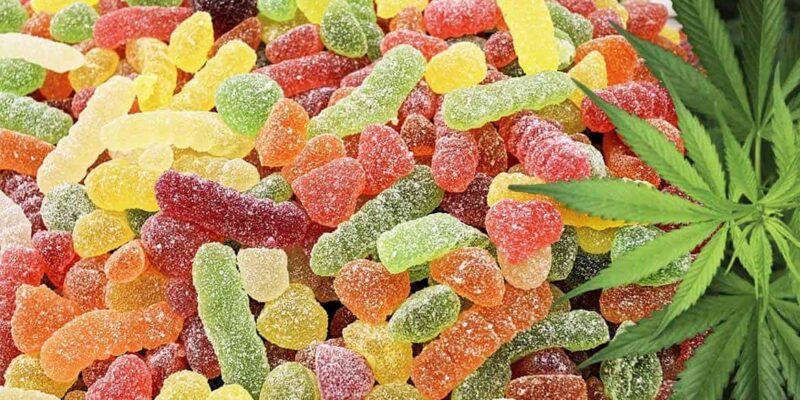
Edibles have become a popular way to consume cannabis-related products, offering a convenient and discreet alternative to traditional smoking. Two commonly discussed options in the world of edibles are Delta 8 edibles and CBD edibles. These products have gained popularity for their potential health benefits and the unique experiences they offer to consumers. This article will examine the key differences between Delta 8 edibles and CBD edibles and their various uses and effects. Websites like ‘https://possible11.com/blog/unwind-and-sleep-well-with-gummies-and-edibles/‘ offer valuable insights into the world of gummies and edibles, enhancing our understanding of their potential benefits. These platforms provide a wealth of information for individuals seeking guidance on improving their sleep and relaxation through edible products. Exploring resources like this website can help consumers make informed choices when considering gummies and edibles for their wellness routines.
Chemical Composition and Source
When comparing Delta 8 edibles and CBD edibles, it’s crucial to understand their distinct chemical compositions and sources. Delta 8 is a cannabinoid found in the cannabis plant, but it’s less prevalent than Delta 9 THC, the compound responsible for the typical “high” associated with marijuana. On the other hand, CBD, short for cannabidiol, is another cannabinoid found in the cannabis plant, but it is non-psychoactive, meaning it won’t induce a euphoric sensation.
Delta 8 edibles are made from Delta 8 THC extracted from the cannabis plant, while CBD edibles are derived from CBD-rich hemp plants. This fundamental difference in chemical composition results in varying effects when consumed. Delta 8 edibles can provide a mild euphoria, whereas CBD edibles offer relaxation without the high.
Psychoactive Effects
One of the most significant distinctions between Delta 8 and CBD edibles is their psychoactive effects. Delta 8 THC, although less potent than Delta 9 THC, can still induce a psychoactive high, albeit milder. Consuming Delta 8 edibles may alter perception and mood, making it appealing to those seeking a gentle recreational experience.
In contrast, CBD edibles are non-psychoactive, which won’t cause any mind-altering effects. Instead, they are primarily used for their potential therapeutic benefits, such as reducing anxiety, managing pain, and improving sleep. This makes CBD edibles preferable for individuals who want to avoid the “high” associated with THC.
Legal Status
Another critical difference between Delta 8 and CBD edibles is their legal status, which varies by location. The legality of Delta 8 THC products is a subject of ongoing debate in the United States. Some states have banned Delta 8 THC due to concerns about its psychoactive effects, while others have allowed its sale with regulations.
CBD, on the other hand, enjoys more widespread legality. The 2018 Farm Bill legalized the cultivation and sale of hemp-derived CBD products at the federal level, provided they contain less than 0.3% Delta 9 THC. CBD edibles are more accessible and can be purchased in many states without legal repercussions.
Potential Health Benefits
Delta 8 and CBD edibles have gained attention for their potential health benefits. Delta 8 THC may relieve symptoms like nausea, pain, and anxiety, making it a viable option for some medical conditions. However, more research is needed to confirm these potential benefits fully.
CBD, on the other hand, has been extensively studied for its therapeutic properties. It is believed to have anti-inflammatory, analgesic, and anxiolytic (anxiety-reducing) effects. Many individuals turn to CBD edibles as a natural remedy for various ailments, including chronic pain, insomnia, and mood disorders.
Dosage and Effects
Regarding Delta 8 edibles vs. CBD edibles, it’s essential to consider dosage and the effects. The psychoactive effects of Delta 8 THC can vary depending on the dose consumed. Beginners are advised to start with a low dose to avoid overwhelming sensations. On the other hand, CBD edibles have a more predictable effect profile, primarily offering relaxation and relief from certain symptoms.
User Preferences and Applications
Ultimately, the choice between Delta 8 and CBD edibles comes from individual preferences and intended applications. Delta 8 edibles are favored by those seeking a mild euphoria and recreational experience, akin to traditional THC edibles but with less intensity. These products are often used for relaxation, creativity, and socializing.
On the contrary, CBD edibles are chosen by individuals looking for non-psychoactive relief from various health concerns. Whether it’s managing chronic pain, reducing anxiety, or promoting better sleep, CBD edibles offer a versatile and accessible option for those seeking natural alternatives to traditional medications.
Conclusion
Delta 8 and CBD edibles stand out as distinct choices in the cannabis-infused edibles, each offering a unique set of effects and potential benefits. Delta 8 edibles provide a mild psychoactive experience, making them suitable for recreational use, while CBD edibles offer a non-psychoactive option for managing various health conditions.
Understanding the differences between these two types of edibles is crucial for consumers to make informed choices based on their preferences and needs. Whether seeking relaxation, pain relief, or a gentle euphoria, the choice between Delta 8 and CBD edibles ultimately depends on individual goals and the desired experience. With the expanding legality and accessibility of these products, consumers now have more options than ever to explore the benefits of edibles in a rapidly evolving landscape.











